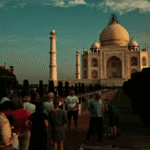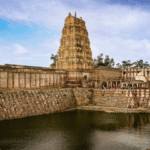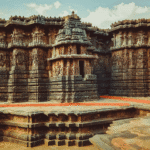
South India is a land of rich traditions, diverse culture, and vibrant festivals that celebrate history, mythology, and communal harmony. From grand temple rituals to extravagant dance and music festivals, the Southern states- Tamil Nadu, Kerala, Karnataka, Andhra Pradesh, and Telangana offer unique and colourful experiences filled with the aroma of traditional dishes, the sound of folk music, reverberating through streets. These festivals, deeply rooted in regional customs and folklore, are the true reflection of the spirit of South India. If you are a traveller looking to experience the best of South Indian culture, this blog opens the door to exploring and enjoying the 8 must-expense traditional festivals in South India that will leave you mesmerized:
A harvest festival of gratitude, Pongal is one of Tamil Nadu’s most significant festivals, marking the harvest season with thankfulness towards nature. Celebrated over four days in mid-January, it is a time of joy, family reunions, and special rituals. The word Pongal signifies ‘to boil,’ which highlights the idea of boiling milk in a clay pot, which symbolizes the prosperity and abundance of the state. The festivities include traditional folk dances and vibrant Kolam decorations at every doorstep. Plan your Tamil Nadu Tour during the Pongal festival to enjoy traditional folk songs, witness the stunning kolams, and enjoy the traditional dishes.
Ugadi, the Telugu and Kannada New Year is celebrated in March or April with grandeur. It symbolizes the beginning of a new era and is marked by special rituals, house decorations with mango leaves, and the preparation of Ugadi Pachadi–a dish made of six flavours representing different emotions of life (sweet, sour, bitter, salty, pungent, and astringent). Astrologers also read out the year’s predictions, making it a festival filled with spiritual significance. When planning a South India Tour, plan to witness the region at its best during the Ugadi festival.
Held in April or May at the Vadakkunnathan Temple in Thrissur, Kerala, Thrissur Pooram is considered the Mother of all Poorams. This festival is known for its grandeur, featuring caparisoned elephants, traditional percussion music (Panchavadyam), and an awe-inspiring fireworks display. The highlight of the festival is the spectacular Kudamattam, where majestic elephants adorned with golden headdresses stand in a row, and their riders engage in an umbrella exchange competition, creating a breathtaking visual spectacle. If you want to witness the marvel of this festival, book our Kerala Tour Package and indulge in the festive vibe of the state.
Mysore Dasara Karnataka’s grandest festival is a ten-day celebration held in September or October to mark the victory of good over evil. It is associated with the legend of the goddess Chamundeshwari, also known as Durga, slaying the demon Mahishasura. The Mysore Palace is illuminated with over a thousand lights, and the festival concludes with the grand Jumbo Savari, a royal procession in Vijayadashami featuring beautifully adorned elephants, musicians, and dancers. The entire city of Mysore transforms into a cultural hub during this period, making it an ideal time to plan your Karnataka Trip and witness this state’s cultural heritage.
Hampi Utsav or Vijay Utsav is an annual festival celebrating the rich heritage of UNESCO-listed ruins of Hampi, the former capital of the Vijay Nagar Empire. Held in November every year, this festival showcases traditional puppet shows, dance performances, and musical concerts known as Janapada Kalavahini and the Jumbo Safari or the elephant march are important features of the festival for recreating the grandeur of the Vijay Nagar era. The highlight is the spectacular light and sound show that brings the Hampi stone-carved history to life. This grand celebration attracts cultural enthusiasts to visit Hampi and explore this grand festival that is full of liveliness, colours and happiness.
Onam Kerala’s most important festival is a ten-day harvest festival celebrated in August or September. It commemorates the mythical homecoming of King Mahabali, who is believed to have visited his people during this time. It is a festival of unity and joy, celebrated across Kerala regardless of caste, community, or religion, with equal joy and enthusiasm. Book our Kerala holiday packages during Onam to feel the festivity of the state and immerse yourself in the culture and tradition of Southern land. The festival includes:
Held once every twelve years in Kumbakonam town in Tamil Nadu, the Mahamaham Festival is a massive religious gathering where thousands of devotees take a dip in a sacred Mahamaham tank believed to cleanse their sins. The festival features grand temple processions, rituals, and cultural events. The next Mahamaham will take place in 2030, drawing millions of pilgrims from all over the country.
The Karaga festival, celebrated in March or April, is dedicated to the goddess Draupadi. It is a significant festival for the Thigala community in Bangalore. The festival’s main highlight is the Karaga Beraham, who carries a sacred floral pyramid on his head and dances through the streets without touching it. Accompanied by a splendid procession started from Dharmarayaswamy temple with the Karaga carrier dressed in women’s attire with drumming and folk performances which halts at the Dargah-e-Sharif of Hazrat Tawkal Mastan, marking the procession with communal harmony.
The cultural festivals of South India are a true reflection of its rich heritage, deep-rooted traditions, and communal harmony. Each celebration offers a unique experience, from religious fervour to cultural extravaganzas. Whether you seek spiritual enlightenment, vibrant processions, or mesmerizing dance performances, these festivals provide an unforgettable journey into the soul of South India. If you are planning holidays in south India, make sure to align your visit with one of these astonishing festivals. You won’t regret it!

11 Places Every American Tourist Should Visit in India
25 Feb 2026
10 Best Famous Temples to Visit in Karnataka
24 Feb 2026
13 Top Things to Do in Sikkim for an Eventful Holiday
24 Feb 2026
13 Best Nature Weekend Tours In and Around Karnataka
23 Feb 2026
12 Best Places to Visit in Phuket, Thailand
20 Feb 2026